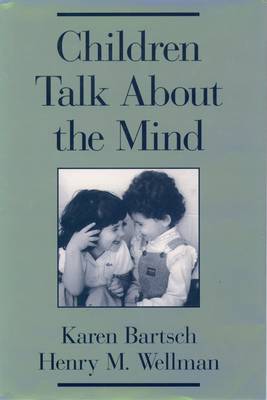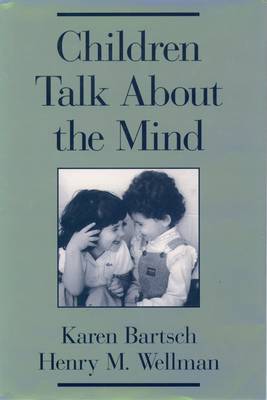
Door een staking bij bpost kan je online bestelling op dit moment iets langer onderweg zijn dan voorzien. Dringend iets nodig? Onze winkels ontvangen jou met open armen!
- Afhalen na 1 uur in een winkel met voorraad
- Gratis thuislevering in België vanaf € 30
- Ruim aanbod met 7 miljoen producten
Door een staking bij bpost kan je online bestelling op dit moment iets langer onderweg zijn dan voorzien. Dringend iets nodig? Onze winkels ontvangen jou met open armen!
- Afhalen na 1 uur in een winkel met voorraad
- Gratis thuislevering in België vanaf € 30
- Ruim aanbod met 7 miljoen producten
Zoeken
€ 96,45
+ 192 punten
Uitvoering
Omschrijving
The emerging concept of other people is a critical phase in childhood develoment with deep implications for learning, language and the entire socialization process. But what, exactly, do children understand about the mind? And when does that understanding first occur? In this groundbreaking book, Karen Bartsch and Henry Wellman answer these questions and much more by looking at what children themselves have to tell us about their evolving conceptions of people and their mental lives. By examining thousands of everyday conversations the authors advance a comprehensive "naive theory of mind" that incorporates both early desire and belief-desire theories to trace childhood development through its several stages. Throughout, the book offers a splendidly written account of extensive original findings and critical new insights that will be eagerly read by students and researchers in developmental psychology, cognitive psychology, philosophy, and psycholinguistics.
Specificaties
Betrokkenen
- Auteur(s):
- Uitgeverij:
Inhoud
- Aantal bladzijden:
- 248
- Taal:
- Engels
Eigenschappen
- Productcode (EAN):
- 9780195115666
- Verschijningsdatum:
- 20/02/1997
- Uitvoering:
- Paperback
- Formaat:
- Trade paperback (VS)
- Afmetingen:
- 156 mm x 234 mm
- Gewicht:
- 385 g

Alleen bij Standaard Boekhandel
+ 192 punten op je klantenkaart van Standaard Boekhandel
Beoordelingen
We publiceren alleen reviews die voldoen aan de voorwaarden voor reviews. Bekijk onze voorwaarden voor reviews.











